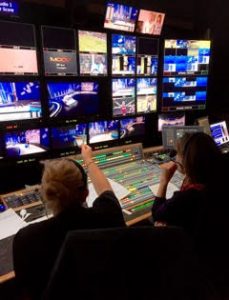Dominating directing: Freelance director Kylie Jenner on her path to the top
The powerhouse that is Kylie Jenner has forged her way through the world of sports broadcasting, carving herself a successful career as a freelance director. For much of her working life, she was a production assistant, eventually becoming a director to save herself from working with, “men that were far less skilful than me”.

Kylie Jenner shares her opinions, at the SVG Europe Women winter networking event with BT Sport and Timeline, November 2018
Over the course of her career Jenner has worked for the likes of Sky, BT Sport, ESPN, ITV Sport, and HBS, and has covered three World Cups including last year’s event in Russia, as well as setting up and being director of BT Sport’s UEFA Champions League Goals Show and BT Sport Score.
Yet in the beginning, from her local comprehensive secondary school in Croydon, South London, she was told at the age of 15 that she was too young to specialise in sports journalism. Her English teacher said she had a flair for writing about sports after she wrote about then-current events, Ben Johnson’s performance and disgrace at the 1988 Seoul Olympics and the 1989 Hillsborough disaster.
Jenner comments: “I went to a local comprehensive that was the worst in Croydon, but I was in the top set and always wanted to work hard. When I wrote about the Hillsborough disaster and Ben Johnson for coursework, my teacher spotted my writing ability for sports subjects and said I could do something with that, but a careers advisor said it was too early for me to specialise. Because of that, for A-Levels, I chose English, French and Geography, and also picked a Law GCSE. It was my Law teacher who said to me that I shouldn’t be there at the school; he said, “you’ve got a passion”.

Kylie Jenner [left] directing on the BT Sport UEFA Champions League Goals Show
Fuelled by passion
Jenner managed to get three weeks of work experience at Sky Sports as a production secretary, in 1992.
“I’m not saying I was the best production secretary; I was working for the head of football at the time, Vic Wakeling. I wrote letters for him and learnt the need for attention to detail, as a lot of those letters came back for me to redo. He went on to become head of Sky Sports.”
After her work experience, Sky Sports stayed in touch with Jenner and would call her if a shift was available, much of which involved working on a lot of US-based golf. “My poor mum!” Jenner exclaims. “We lived in Croydon and Sky is in Isleworth; she drove me to and from work with a 1am pickup.”
“I think you have to prove yourself more as a woman [in sports broadcast]; the assumption for a man is you know about sport and production.”
In June 1992 Sky won the rights to a new product; the Premier League. The company asked Jenner if she wanted a job as one of three production secretaries they were taking on. In her new position, Jenner was able to look at the different positions involved in sports broadcast. She says: “I looked around at all the jobs that were available. I knew I couldn’t sit in the edit suite; that just wasn’t me. But I saw the production assistant role and thought, that’s what I want to do. I asked my boss about it.”
Jenner comments that her proactive approach at that point and later in her career has been beneficial. She explains: “Rather than sitting and waiting for something to happen, you have to be proactive. I think you have to prove yourself more as a woman [in sports broadcast]; the assumption for a man is you know about sport and production.”

Kylie Jenner taking part in the SVG Europe Women winter networking event with BT Sport and Timeline, in November 2018
Jenner gives an example of a time when she had to confront male assumptions of her knowledge of sport: “One of my first jobs as a production secretary was doing contracts, getting them typed up and signed. I’d have to get the producer to sign before the guests. One day, after the producer, Andy Melvin, had signed, he pointed out the guest to me, who was Alan Smith, the Crystal Palace manager at the time, and told me who he was. Being from Croydon, and knowing about football, I know Crystal Palace quite well, and had to say, “yes, I know!”
He then pointed out Lawrie Sanchez, I replied: “Yes, he scored the winning goal for Wimbledon against Liverpool in the 1988 FA Cup Final”. However, after Andy realised how much I knew about football, he then championed me a lot.”
Moving up the chain
Jenner became a production assistant and 18 months later, her big break came: “Because I’d proved myself, it was Andy who agreed I could go and be the production assistant on the new Super Sunday and Monday Night Football programmes, which were the biggest things on sports TV at the time. Dianne Endersby, the grandmother of all production assistants, trained me; I knew nothing!”
The first match for Monday Night Football that Jenner did on her own added to a steep learning curve. She says: “There was a bomb scare at QPR; but that’s when you learn when things go wrong. You also learn the most important thing from a production assistant point of view is to keep calm. Producers and directors can get quite stressed, but the production assistant is the calming influence in general, maybe because that role is normally carried out by the only woman on the crew. Being the only female, you bring something different to the job.”
Balancing home and work
In January 1999 Jenner had her first son. She found the work-life balance hard to achieve, she states: “I wanted to have more of a family life, which in the job we do is very hard, working every weekend and a lot of evenings. It was a bit of a problem. Then it was suggested to me that I might want to go freelance, and Sky would look after me. This was of course in the days before maternity leave and pay were as good as they are now. So in August that year, I left Sky.”
“I never had an aspiration to be a director. But seeing lots of rubbish men around me doing a terrible job made me feel I had to become one”
Jenner continues, the struggle for the work-life balance for women is difficult: “Over the years I’ve come to the conclusion that all this belief that women can do and be everything is impossible; something has to give, and I think it’s the same for men but for them, their family life suffers. I’m part of a generation where we’re told we can be and do anything and all will be fine, but I couldn’t. It took me lots of years to come to peace with the fact I couldn’t do everything. I’m an all or nothing kind of person; I loved my job but I also loved being at home with my son, and as a result, I felt I was doing neither well enough.”
Being a freelancer was no easy solution to the work-life problem, however. Jenner notes: “The joy of being a freelancer is you think you can work when you want, but you can’t because if you say no to anyone there is a fear they won’t ask again. It’s like a check and balance account; you can say no three times, then you have to say yes three times! But I said no too many times to Sky and they stopped asking.”
Directing dilemma
In 2003 Jenner picked up a full-time role with Sky Travel Shop as a production assistant, but she was also able to do some production management, “keeping on top of all the VT’s filmed,” she notes. “We recorded seven shows on one day per week. It was very busy,” Jenner says.

Kylie Jenner [right] hard at work in the gallery
“I never had an aspiration to be a director,” Jenner goes on. “But seeing lots of rubbish men around me doing a terrible job made me feel I had to become one.”
However, Jenner then had her second son and at the same time, her husband was diagnosed with cancer (which he went on to beat). With family commitments her top priority, Jenner cut her hours down to three days a week. She worked for Sky Travel Shop for two more years until another opportunity came her way; Setanta Sports.
In January 2006 Jenner was asked if she was interested in a job at Setanta Sports working mainly as a director, with some production assistant work. She said yes and was back in the world of sports broadcast.
Rough with the smooth
The channel went live in August that year. Two years later while on holiday watching the BBC Six O’Clock News, Jenner found out the channel had closed down, and with it, her job. She comments: “I found out on the news that my job no longer existed. We knew for a year it was coming, but it was a nasty way to find out. A week after we got home from our holiday, I got a call from Duncan Walkinshaw who I used to be a production assistant for at Sky Sports, to be a freelance production assistant and to direct for Al Jazeera Sport (now beIN Sports) at ITV Sport.”
Jenner worked for both Al Jazeera Sport and ITV Sport, and was asked to cover the 2008 World Cup. However, her husband needed some persuading. “There were disagreements at home about it. My husband was not pleased. But I was being asked by ITV to cover one of the most important sporting events in the world. He realised I’d made my mind up, and when that happens, what I want to do happens. I explained it to my sons by saying it’s like David Beckham being asked to play for England!”
She goes on: “I ended up being the production assistant for the World Cup final. If my career had stopped then, I’d have been more than happy with that.”
Off the back of that event, Jenner met people from ESPN, which had picked up the remaining one year of Premier League rights from the defunct Setanta Sports, and extended it for a further three years. She worked as production assistant and director for ESPN and ITV over several years, including for the 2012 Champions League including the final in Munich, which Chelsea won on penalties.
Jenner comments: “You have to sometimes remind yourself you’re working. This job has fulfilled a desire in me to travel. After thinking I’d only get to do one World Cup, I also got asked by HBS to do the Brazil World Cup, where I was production assistant at the grounds there, and then in Russia again for HBS. This year HBS has asked me to go as a coordinating producer to the Women’s World Cup, which is great.”
Career confidence
BT Sport has also played an important role in Jenner’s career, she says. She’s worked for the company as a freelancer since it started in 2013, and through working on its Premier League programming, she has gained the confidence to stop being a production assistant and to concentrate on directing.

On stage at the SVG Europe Women winter networking event with BT Sport and Timeline, Kylie Jenner [third from right] speaks about the technicalities of women in sports broadcast tech jobs
On being a woman in sports broadcasting, overall Jenner says her gender has not been an issue, because her personality and general determination to succeed has overridden any obstacles. “I haven’t really experienced a huge amount of sexism. I don’t feel my sex has stopped me doing what I want to do. It’s only recently that I’ve come up against [poor male attitudes towards women], and it’s more to do with the insecurities of those men than me.”
Jenner refers to an incident at the BT Sport studios where a group of executives came onto the studio floor to observe one of Jenner’s shows. She overheard one say to BT Sport chief operating officer Jamie Hindhaugh, “Doesn’t she need to know about football [to be the director]?”, to which Jenner says Hindhaugh replied, “She probably knows more than you do”. Jenner adds: “Jamie has been a great champion for me. He understands what I can do and lets me get on with it.

Kylie Jenner on stage at the SVG Europe Women winter networking event with BT Sport and Timeline, November 2018
“You get everyday sexism but as a freelancer, to get to where I’ve got to now, if there was institutionalised sexism I’d have been kept in my ‘place’ as a production assistant,” she notes.
Long way to go
There is still a long way to go for female directors, Jenner says: “I don’t think the percentage of women in sports broadcast has changed greatly since I started. On a good day, 25% of a crew will be female. The BBC were lording it saying one-third of their crews were female, but that still isn’t brilliant.”
Yet the solution is not to simply employ more women, says Jenner. They have to be the right people for the job.
“You have to be a certain type of person to be a director; that’s why Gemma [Knight, junior director, BT Sport] is very good; she gets it. I wouldn’t want to employ someone just because they’re female; I don’t think that’s doing anyone any favours.”
Summing up, Jenner concludes: “In quite a male environment, it’s been really good that my boys can see their mum doing so well. It shows them that men and women are equal. Ultimately, it’s been a great life and if it was my time to fall off the merry-go-round now, I’d be happy with what I’ve achieved.”

